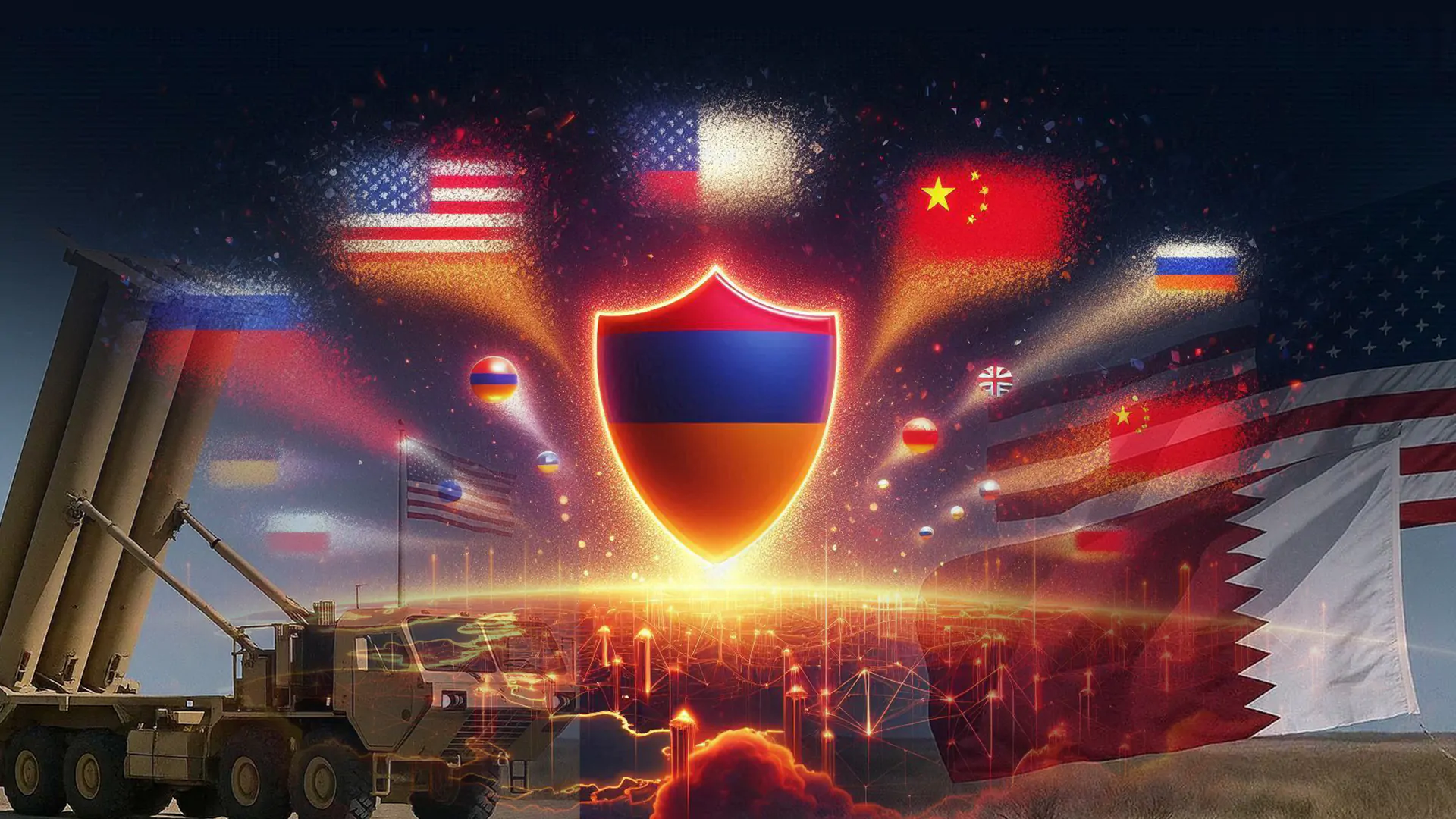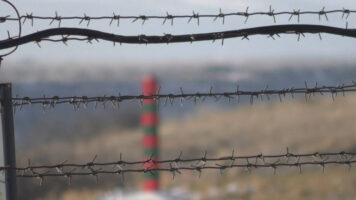Peace without strength: Whom do populist calls for peace serve?
23.09
2025
Why do states arm themselves despite calls for peace, or why shouldn’t we give in to the weak, cheap, manipulative, bankrupt and anti-expert claims of the authorities in Armenia that the defense budget should be cut and that the money should be redirected to social sectors? In an election year the Pharisees always become active, laying down asphalt — which is a good thing, and no one can deny that the quality of interstate roads in today’s Armenia has significantly improved; this is true. But alongside that there is also the loss of homeland and strategic vital positions, and for that reason the quality of the asphalt becomes less significant, because in this changing world the state’s primary concern must be security. Let us stress that the policies pursued by Nikol Pashinyan in all arenas are purely populist — even those about peace are not real. Equally unreal are everything from the laughable idea of a “real Armenia” to the imitation of peace. It is clear that one of the deepest contradictions in human history is the striving for peace and the need for self-defense. International organizations and peace theorists have consistently preached the desire to renounce the threat of force, but at the same time states continue to allocate a significant portion of their budgets to the army, military equipment and ensuring security.
At first glance this phenomenon seems contradictory — on the one hand states strive for peace, and on the other they substantially increase military budgets — but in reality this logic follows from the nature of state existence and the structure of international relations. First: the main mission of the state is the protection of its people and territory, and this cannot rest on moral calls alone. The international system is anarchic; there is no organization that can guarantee universal security. The UN and other organizations play mediating and conciliatory roles, but they lack the force to impose peace everywhere, therefore every state conditions its existence primarily on its own strength.
Second: history has repeatedly shown that unilateral disarmament inevitably produces dangerous vulnerability. As long as there are aggressive regimes, dictators, expansionist policies, and states fighting for large economic interests, an undefended state will always become their victim. And if anyone thinks that calls for peace directed at an aggressor like Azerbaijan can restrain it from pursuing territorial claims against Armenia, they are in an unforgivable delusion, because a country’s security is defended not by populism but by balances of power and calculations of interest.
Third: the armed forces are not only instruments of war but also means of deterrence. When a state displays its defendability, it reduces the adversary’s temptation to attack or apply pressure. In other words, a balance of forces is the best guarantee of peace.
Beyond all that, the army and the military sector also perform internal functions. They contribute to technological progress, to strengthening patriotism, to national cohesion and to the stability of state institutions. Many innovations have originated in military research, and in society the army remains a crucial link for identity and state defense. In short, calls for peace and pacifist projects are important, but their viability is conditioned by strength. A state that ignores security requirements endangers the existence and future of its people. Therefore armament is, in fact, a means of preserving peace, and it is not said in vain: “If you want peace, prepare for war.”
The primary function of the state is the protection of sovereignty and territorial integrity. Even if a strategy of peace is primary, many historical examples show that unilateral desire almost always fails, because the adversary or enemy does not share the same values. It is sad, but the current authorities of the Republic of Armenia are guided by the above principle — even removing the image of Mount Ararat from the passport stamp and emphasizing that if we do not do that, then the Turks and Azerbaijanis might put Mount Aragats instead — what a dull reasoning that is, when we all know that for years at the state level in Azerbaijan they have been encouraging, for example, the display of maps that include many territories of Armenia, if not all of Armenia, within Azerbaijan’s borders.
To summarize, there is no world government in international relations that can impose peace. Each state operates in an “anarchic system” where there is no guaranteed protection. Therefore responsibility for security is placed on the state itself; even if there is no war today, an uncertain future forces states to prepare for any development. Internal and external political factors can change rapidly: an ally can become an enemy, and a peaceful environment can turn into hot conflict.
I will try to give one vivid example. Qatar, which signed and ratified the Abraham Accords five years ago at the end of Donald Trump’s first presidency, had long been conducting secret negotiations with Israel. That state had become and continues to be a convenient venue for negotiations between Islamist extremists and the West, including Israel. Billions were spent to make it the safest capital of soft power, but last week we witnessed yet another incredible Israeli operation in the center of Doha, which once again proved that perceptions of peace are, to put it mildly, absurd when the state security is shaken. Incidentally, no one expected what happened in Qatar, because outside the territory of the United States the largest American military base in the world is located there, yet despite that base Washington apparently did not want to or — it seems absurd to think that it could not — protect its closest ally. Nonetheless, Qatar remained undefended, and in broad daylight a whole building in the center of Doha was bombed, followed only by words of regret and condolences. Moreover, it remains a puzzle for experts and analysts how Israeli missiles reached Doha — by what route and through which countries’ airspace they passed.
Let me note that NATO’s central command headquarters is in Oklahoma; it is the largest and most modern. Qatar’s Al-Udeid military base is one of the most important in the world in terms of role and influence, even more powerful and better equipped than Turkey’s Incirlik base. The radars stationed there are capable of detecting any missile, drone or fighter from Yemen to Pakistan. Therefore, it is absurd to think that the American radar systems located in Qatar could not detect or track fighter jets leaving Israel — mainly F-15s and F-35s — plus the huge airborne tankers that refuel them, because the American technical arsenal is the most modern and Israel uses that same American technology — with lesser capacities. Moreover, the building that was bombed, where the political-military elite of Hamas were located, was only 32 km from the Al-Udeid base, and President Trump spoke as if he was unaware of the Israeli military operation, which is unbelievable. Let us also emphasize that four months ago the Emir of Qatar gifted President Trump a civilian aircraft worth half a billion dollars, fitted with state-of-the-art equipment and comforts, and Qatar concluded deals worth more than $3 billion with the U.S. in gas cooperation agreements. In my various analyses I have often presented interesting and key personalities from American and global decision-making centers who play essential roles in diplomatic and political processes, hoping that all that analysis and knowledge will help those who formulate our country’s strategy — if such people exist — to make correct decisions.
One of those figures is Ron Dermer — the U.S. ambassador to Israel, a close friend of President Trump and of the American administrations of the last 15 years, and the chief adviser to several Israeli prime ministers, mainly Netanyahu. Three months ago Dermer met with Syria’s foreign minister, and he arranged a meeting in Baku between high-ranking Syrian and Israeli officials, including Syria’s transitional president Ahmed al-Sharaa and the head of Mossad. I have addressed this topic in detail and noted Azerbaijan’s role as a principal bastion against Iran, and also the fact that there is a Syria-Israel-Azerbaijan consensus to transfer thousands of fighters from terrorist groups in Syria to occupied Artsakh. Thus, Azerbaijan is actively engaged in all anti-Iranian operations of Israel, at least in providing territory and logistical opportunities, in collecting intelligence data, and in keeping the anti-Iranian front active. Note also that Ron Dermer is Israeli, with close ties both in Azerbaijan and within the U.S. Armed Forces establishment. I also recall the assassination of Ismail Haniyeh, head of Hamas’s Political Bureau, in Tehran and the close cooperation of Mossad and Azerbaijan’s intelligence services. Today Egyptian intelligence circles openly state that Azerbaijan played a key intelligence role in the missile strike in Qatar, although Baku’s foreign ministry hastened to deny such reports. What Israel does to Hamas, Azerbaijan is attempting to do to Armenia: if Israel does not kill the negotiators but kills the negotiation itself, then likewise Azerbaijan kills any vision of peace, remaining unwavering in its territorial and demographic claims against Armenia.
It is clear that peace treaties often do not work without a balance of force, and if the state lacks a deterrent factor that maintains coveted peace, it will become a victim. The two world wars of the 20th century and the elimination or occupation of small states (for example Poland, the Baltic countries, Armenia in various eras) have shown that undefended states easily become victims of aggression. If we want real peace and a truly independent Armenia, then we must cast off the shroud of self-deception and have the courage to admit that by remaining silent we continue to sink the future of our children and homeland, that this environment of lies and falsities has been imposed on us and we did not adopt it voluntarily. There are several ways to fight these bandits; we have tried some and achieved more or less results, but overall we have not succeeded. We will free ourselves from the chains imposed by the rule of evil; we will break them, but for that we must believe that our salvation comes from the ideology of spiritual Armenia. Nikol is not so stupid as not to understand where his enemy is — Nikol’s enemy is not only his political opponents; Nikol’s enemy is the spiritual Armenian person who turns the people into a nation, and Nikol does not want us to become a nation because there he sees the danger of his inglorious sunset. Nikol and his henchmen want to see a people burdened with everyday problems — a people without vision or perspective, a castrated kind who, though speaking Armenian, like the average globalist, care nothing for faith, culture or borders, are wonderful consumers and have one goal — to eat, drink and have fun; that is, where there is bread, there they will live — and in that case he will speak only the language of the stomach. In that situation Nikol will easily persuade that the correct thing is to accept all the enemy’s terms for the sake of “real” independence and freedom.
Armenia’s security and the unity of the Armenian people rest not only on political but also on spiritual and cultural foundations. The strength of the Armenian is not only in the Republic of Armenia but also in the spiritual homeland. When the majority of our physical homeland is lost, when our national-state vital interests are threatened, our salvation is in returning to the roots from which we have strayed far. We have given up our perceptions and capacities for freedom and justice to evil, laziness and self-deception, and here is where Nikol is able to play us, here is where he manipulates us — taking advantage of our people’s perhaps naivety, or perhaps gullibility. I am not a hopeless optimist; I say very realistically that we will get rid of these people and become the nation and state that has functions, that has a mission for the world. We have been at the crossroads of clashes and coexistence of civilizations; we were once, and now we are not because we do not want to face reality. They try to convince us that we should not bother to pursue values and creative thought, but we know our nation’s history, its strengths and weaknesses, and we believe we will overcome this cancerous metastasis clinging to our identity and development pulse, and we will again become a creative, productive people believing in the homeland’s integrity — a nation that the enemy will think long and hard before attacking. Nikol wants to steal this purpose from the nation and make it a mass without aspirations. Nikol Pashinyan is the balm of the Turkish state’s security complexes, whose place is not in the government building, but in the prison of a truly independent Armenia, with a just sentence of life imprisonment.





